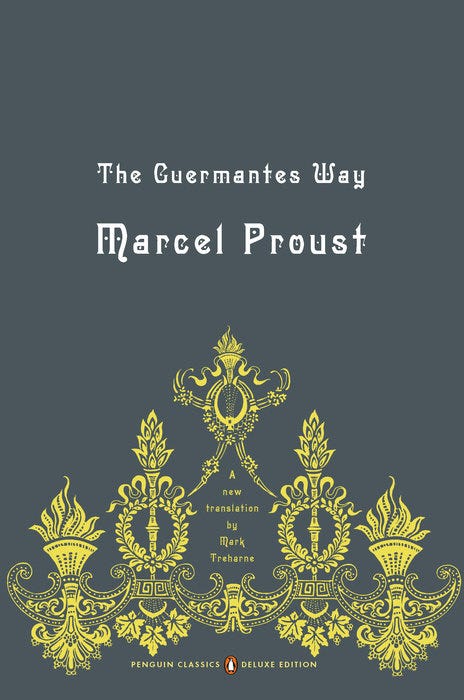The Guermantes Way (Part 3 of "In Search of Lost Time) by Marcel Proust
Translated by Mark Treharne, Penguin ClassicsI
This has been a tragic and horrible year for me, and I have been thinking of getting therapy, but the cost is a tad too much for me. So instead, I decided to invest my money into the complete editions of In Search Of Lost Time by the master, Marcel Proust. So far, these books are like bursts of lighted energy, and at the age of 67, I decided to leap into the comforting arms of Proust’s thoughts, sensibility, and his study of how society works its magic and horrors. The Guermantes Way, number three of seven volumes, is an explosive document of a time, but also one can find traces of such horrific moments in the contemporary now. The big scandal at the time was the Dreyfus affair, which exposed a strong anti-semitism in France, and is the long and dark shadow that runs through this part of the epic novel. The French were divided by this issue, and one can see traces of that era running through America at the moment.
The narrator who is telling this tale is an odd fellow. He has voyeur symptoms, but he is a stalker among the high-end family of The Gurementes. He worms his way into their parties and world, but here we don’t get a Patricia Highsmith sense of suspense, but a reflection of what is around the narrator and how he conveys the narration. There is a lot of obsessive love in these books, both from the narrator and observing others in the Gurementes family and how they dwell in the murky waters of relationships and sexuality. The deepness and intensity of Proust’s prose give me vertigo. The writer presents a world that seems endless, and the emotions and thoughts are so eternal that there is no beginning or end. Still, the infinite reflection of society at work could be the French upper-class family, The Gurementes, or in another universe, the world of ants and how they work for their Queen Ant. In that sensibility, the narration here can be placed anywhere in time and any place.
The most beautiful part of the book is the chapter devoted to the death of the Narrator’s Grandmother, which is a painful read after going through my mom’s death at our home. Poetic but grounded in what lies ahead of us as we read the suffering of this poor woman. Genuinely moving, and I don’t know anything about Proust’s family (at the time of this writing), but I have to imagine there is truth in this fictional setting. Also, the doctor’s communication with the patient is painfully realistic.
The awareness of death is very much part of The Gurementes Way, in that we have a sizable chapter on Grandmother, but also the hint of Charles Swann’s medical condition at the end of the book, where he wants to discuss something dire, yet, an issue breaks the mood of the wrong color shoes with the red dress. Like the Grandmother chapter, I also find the ending depressing, but more of an acknowledgment of human nature and how it works out in the Social landscape of the times, but it can equally be now. It’s not all tears; a series of wonderful humorous moments runs through all three volumes, and almost slapstick imagery, such as the Narrator dealing with the modern doorway of an expensive and exclusive restaurant.
I remember moments when a writer turns me around, and Proust is now up there with Osamu Dazai, Robert Benchley, Lydia Davis (who also translated Swann’s Way), and a select few more. I’m very much looking forward to the four other volumes of In Search Of Lost Time.


This is as far as I’ve read in the old, not very welcome translation. But I still fell into Proust’s spell I must get t new translation and continue my travels in his world. Thanks for this Tosh.
I read the whole thing in college... and now I can say, without shame, that I was just too young and distracted to appreciate it. But, like many, I KNOW that I will return to it. Thank you for this, Tosh!